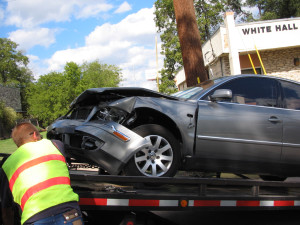Clients often ask us, “I have AAA, is that the same as roadside assistance coverage?” Simply put, the answer is no. Insurance companies vary in what their roadside assistance coverage, or towing and labor coverage, actually cover. The general rule is:
Roadside Assistance coverage covers towing to the nearest place of repair due to a covered claim or mechanical breakdown. This means if your car is involved in an accident or claim and is deemed not to be driven, the insurance company will pay, on a reimbursement basis usually, to tow it to the nearest place of repair. Mechanical breakdown of your vehicle is usually covered as well. The reimbursement basis means that you pay for your tow to the nearest repair shop and submit to the bill to your insurance companies’ claims unit, in which case they send you the check for the amount of the tow. The deductible does not usually apply to towing claims.
Although insurance companies state that they’d like it to be taken to the nearest place of repair, many times insurance companies do put a mileage restriction on this. Often you may have choices for different prices, such as towing coverage up to 25 miles or 75 miles. This gives the consumer options.
So, how does this differ from having AAA? It differs in many ways, primarily the services rendered and cost of the products. Towing coverage on an auto insurance policy is often very inexpensive, sometimes as low as $4 per year. This is much different than the monthly rate paid to AAA to have them on-call, which can be between $5 and $10 per month.
With the extra costs, you’re also provided more services with AAA than with most insurance companies, including: locksmith services, battery jumps, flat tire repairs, emergency gas fill-ups, and more.
This being said, it’s hard to chose one company over the other because they’re both different products at different price points. We recommend having them both because you can’t go wrong. The roadside assistance coverage with your auto insurance is inexpensive enough to where it doesn’t hurt financially to have both and gives you the peace of mind while on the road. If you have any further questions about this blog or these coverages please feel free to contact our office.

